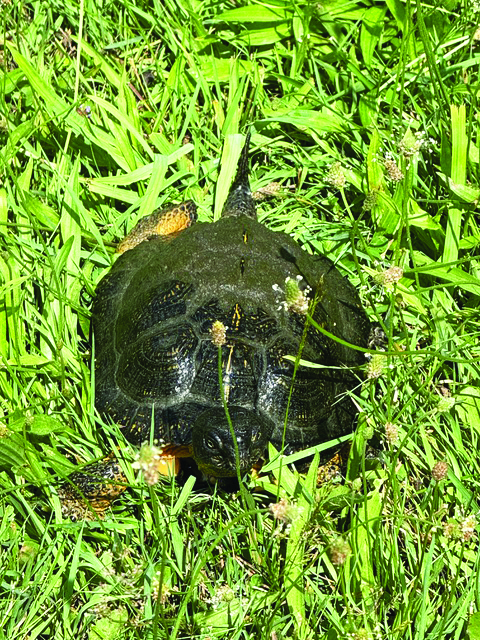Making merry on the riverside: an alternative view
By Tim Mulherin
Sun contributor
“[R]eality is an aggregate of the perception of all creatures, not just ourselves.” – Jim Harrison
A while back, I was surprised to learn about an outdoor music venue opening along the banks of a pristine northern Michigan trout stream.
I shouldn’t have been.
After all, this is what humans do. We live in what we perceive to be an entirely human-centric world. As a result, there is often no consideration for the others—for wildlife.
I know it’s not intentional. Our society is increasingly estranged from nature. Author Richard Louv expressed his concern for this regressive phenomenon in his seminal work Last Child in the Woods: Saving Our Children from Nature-Deficit Disorder. Our apathy for wildlife is a key indicator.
For the past 18 months, I’ve been researching a book about wildlife in Michigan and Indiana, two states I split my time between. I am not a wildlife biologist and have no such formal training, other than taking a mandatory high school course in biology in the seventies. As a result of my many interviews and field observations, I have had an awakening during this second-childhood project. And I can’t shake how it’s transformed my thinking about wildlife, with whom we’re supposed to be sharing the planet.
When the calendar turned to July this year, this new awareness became acute. Fireworks were being set off nightly by can’t-wait patriots in anticipation of the commemoration of the adoption of the Declaration of Independence. Bang! Boom! Domestic pets, especially dogs and cats, trembled whenever the faux bombardment began, desperate to escape the sharp reports punctuating the air.
Yet my immediate thought when seeing our aging, red-coated Pomeranian pacing frantically, demanding to be picked up and consoled, turned to wildlife, whose well-being rarely factors into the human experience.
Now, hanging out along a picturesque northern Michigan stream while sipping cocktails with one’s friends and/or significant other and grooving to the music is a fine thing to do on a summer evening. But then I imagine what the trout and other aquatic creatures are experiencing with that aural disturbance resounding across the crystalline waters—their home. Or the mustelids that live here, such as mink and river otters. The white-tailed deer bolt. The great blue heron lifts off in slow-motion wingbeats to escape the din. The songbirds dart away. The barred owl relocates. While the band plays on.
As I am no biologist—only a citizen scientist in the making—I am also no biblical scholar. Yet I have long disagreed with Genesis 1:26 regarding humanity’s overarching superiority: “Let them have dominion over the fish of the sea, the birds of the air, the tame animals, all the wild animals, and all the creatures that crawl on the earth.”
Has something of profound consequence been lost in translation here? Perhaps the Creator (or the author of this passage) meant we should be stewards of the Earth and not run roughshod over all things wild. Maybe it’s time we recognized that collectively, wildlife deserves better treatment from the one species that can dramatically impact their lives—for better or for worse—given our evolved consciousness.
Granted, this can turn into a contentious, bottomless argument. I’m not advocating for a Bahai approach to extraordinary kindness for all animals (though it is a remarkable way of being, if you can pull it off). I’m talking about respect. This is something we struggle with among our own kind. Expecting us to get outside the box and extend this consideration to species unlike our own is a big—make that HUGE—ask. Yet it can be life-changing for anyone who undertakes such a transformational state of mind. And the planet benefits.
This summer I had the opportunity to spend a sunny July afternoon with Jim Harding, Michigan State University herpetologist and lecturer emeritus. Harding is famously known in the Midwest herps community as “The Critter Guy.” The airspace over his backyard pond was teeming with dragonflies, especially common whitetails (one of the few Odanata species I can now identify in my budding amateur study of these wondrous organic flying machines). Then I spotted several turtles paddling toward us.
As Harding and I chatted, a wood turtle with about a 10-inch shell emerged from the water and made a beeline right for me. “What’s this all about?” I asked as the Glyptemys insculpta stopped abruptly at my feet and craned its neck upward, looking at me with those remarkably animated dark eyes.
“They associate humans with food,” Harding answered. “He was fed this morning, so he’s good for now. But try telling him that.”
Of course, being human, I immediately began to anthropomorphize the experience. But just so. The charming wood turtle and I were entering into a relationship that it initiated, whether hoping to be fed or otherwise. I wondered about its sentience, what it was thinking, how it was experiencing me. I’ve asked this compound question of most of the wildlife biologists with whom I’ve accompanied into the field. They, too, ponder the possibilities, knowing that the question can’t really be answered. Indeed, this mystery doesn’t diminish the wonder of it all. A hungry turtle at one’s feet waiting for a handout is a marvel nonetheless.
For a while now, when urgently summoned by my wife to “do something about that spider,” I’ve opted not to grab a tissue and crush the innocent creature, then give it an instant ceremonial toilet-flushing funeral. Instead, I capture the so-called creepy crawler in a glass and release it outside. True, spiders live in an eat-or-be-eaten world. (Which reminds me of that scene in the 1957 sci-fi movie The Incredible Shrinking Man, when the shrunken protagonist fends off then kills a “giant” spider in self-defense by stabbing it with a ball head pin.) But I don’t want it on my conscience that I needlessly harmed an arachnid that’s actually serving humankind through its diet of flies, mosquitoes, and other tiny, many-legged pests.
As you probably suspect, my friends laugh at my newfound sensitivity—the males especially. It’s so unmanly. Killing a harmless insect (which, I must go on record to say, carpenter ants and ticks are not), for example, is an existential entitlement. Women, though, generally seem to see things differently. Some I know even go the extra mile, as I do, in saving innocent spiders from reactionary human judgment (if not our primordial instinct). I applaud them.
When our wildlife radar is up, we begin to realize how much non-human activity is going on around us, how much we overlook, and how our curiosity can open us up to a deeper connection with nature and feed our souls for a lifetime.
So, I won’t be attending any streamside musical venues, anywhere, anytime. Nor will I think less of those who do; that’s their prerogative. As for me, I’ll make time now and then to repair to a northern Michigan riverside and listen to the music that nature provides, to the welcome accompaniment of wildlife. And that nonhuman “band” will play on, without any complaint from me.
Tim Mulherin is the author of This Magnetic North: Candid Conversations on a Changing Northern Michigan, published by Michigan State University Press. He is currently writing a book about wildlife in Michigan and Indiana.



